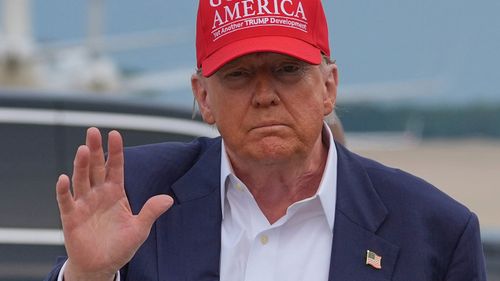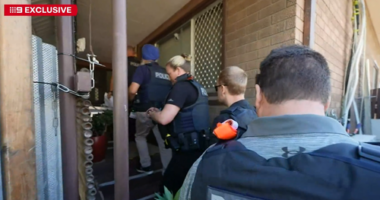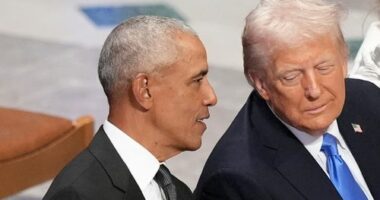Share this @internewscast.com
What will happen after that’s reached at 12.01am US Eastern Time on July 9 is anyone’s best guess.
The stakes could not be higher, with the entire global economy on notice.
On April 2, a date Trump dubbed “Liberation Day,” he unveiled new, “reciprocal” tariff rates for key US trading partners, with some levies as high as 50 per cent.
Collectively, the rates were the highest the US has charged on foreign goods in over a century. Economists quickly sounded alarms about a recession hitting not just certain countries, but rather the whole world.

As the tariffs went into effect on April 9, they sparked a sell-off on Wall Street and the bond market rebelled, forcing Trump to announce a three-month pause to give countries more time to solidify deals with the US, saying investors “were getting a little bit yippy, a little afraid.”
Since then, almost all goods the US imports have been subject to a minimum 10 per cent tariff. Stocks, meanwhile, have not only recovered all those losses but have set multiple new record highs. And inflation has barely budged. But if tariffs start to rise again and inflation roars back, those gains could quickly get erased all over again.
After months of meeting with foreign government officials and countless claims that several trading partners were on the cusp of completing deals, only three have been announced. One of those, with Vietnam, has yet to be finalised and few details are known about it.
Still, the Trump administration is advertising that a flurry of deals are forthcoming. At the same time, the president has threatened to send letters to countries that don’t ink deals, telling them the rate at which their exports to the US will be taxed.
Leading up to July 9, Trump administration officials threatened to simply return to April tariff rates, or possibly even higher levies. They also floated the possibility of extending the pause for countries “negotiating in good faith,” without defining what that means or which it includes.

It’s not clear where Trump, who will get the ultimate say, stands.
“We can do whatever we want. We could extend it; we could make it shorter,” Trump recently said. “I’d like to make it shorter. I’d like to just sent letters out to everybody, ‘Congratulations, you’re paying 25 per cent.'”
“We’ll look at how a country treats us â are they good, are they not so good â some countries we don’t care, we’ll just send a high number out,” Trump also recently said.
On Friday, he said he’d begin sending letters over the coming days.
“They’ll range in value from maybe 60 per cent or 70 per cent tariffs to 10 per cent and 20 per cent tariffs,” Trump said.
For many countries, such rates would deal an even bigger economic blow compared to the levels Trump announced in April. But countries may have the opportunity to still negotiate, given Trump said most new rates won’t take effect until August 1.
America’s evolving pain tolerance for higher tariffs
The deal Trump announced on Wednesday with Vietnam, which calls for minimum tariffs of 20 per cent on Vietnamese goods, double the rate throughout the three-month pause, has raised the possibility that countries may not be able to score lower rates even if they reach a trade agreement.
But considering tariffs on Vietnam were set to rise to a minimum of 46 per cent if the rates Trump announced in April held â which was among the highest Trump announced â 20 per cent suddenly feels like a relief.
That may be an intentional strategy on Trump’s part, allowing him to stick to his major campaign promise of levying higher tariffs on other nations in an effort to raise revenues and bring manufacturing jobs back to the US.
“On balance, we take the US-Vietnam accord as a positive step toward more durable bilateral deals for the US and toward greater clarity for investors,” Ulrike Hoffmann-Burchardi, global head of equities at UBS Global Wealth Management, said in a note last week.
“Headline risks around trade may persist as negotiations continue, but we think the market impact should moderate as President Trump’s negotiating tactics become increasingly familiar,” he said. “Ultimately, we expect the US administration to prioritise economic stability over more maximalist tariffs, especially ahead of the 2026 midterm elections.”













